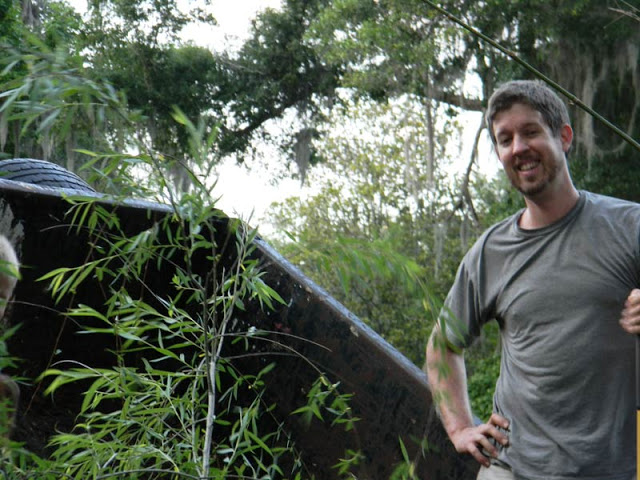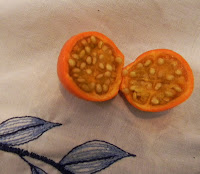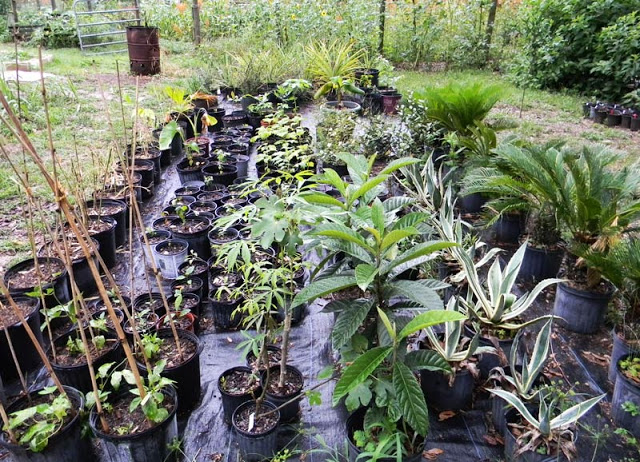What is this “Florida Food Forests?” It’s my brand-new plant nursery!
For the last year I’ve considered jumping into growing some of the hard-to-get edibles I love so much. People are always asking me about cassava, goumi berries, coffee plants, Florida cranberry, chaya, moringa and other cool and rare plants. I love building food forests… but getting the pieces is sometimes painful.
I’ve gathered some interesting varieties over the last few years, bit by bit, and learned to propagate them. A few different people told me I should make the jump and get licensed as a nursery.
That was easier said than done. I needed a new corporation, a nursery license, a sales-tax certificate from the state, a business checking account, checks, office supplies and an accountant to put everything together. Beyond that, I needed dirt, pots, labels, a propagation area, irrigation and all kinds of other fun stuff.
 |
| In the middle of unloading a trailer of potting soil… and loving every minute of it. |
But now – it’s almost all together. And though I’m starting at the bottom of a hole, I think there’s enough demand for some of these plants that it will all be worthwhile. Even if I only break even, I’ll be happy. I know how hard I found it to get these species to begin with… having a place that sells the tough-to-find stuff is totally needed. And, since I couldn’t find anyone else doing it, I’m doing it myself.
Right now you can get in contact via e-mail if you’re looking for something hard-to-find. You can also make an appointment to visit my nursery space. Soon I’ll post a list of shows I’m going to attend – and we’ll probably be opening a booth at the Ocala Farmer’s Market this fall.
Here are a few plants I have in stock right now:
Cassava (potted): $6.00
Cassava (cuttings): $3.00 or 10 for $25.00
Aloe Vera (large pot): $15.00
Loquat, 3′: $10.00
 |
| Naranjilla: a strange edible. |
Solanum quitoense (the naranjilla), small pot: $5.00
Sago palms (which are actually cycads), 2′ tall, large pot: $10.00
Pinecone ginger (edible and useful as lotion), large pot: $10.00
I’ve also put a little website together here: www.floridafoodforests.com
Let me know if you’re looking for something tough-to-find and I’ll put out feelers. As I grow the nursery, I’m going to add a lot more plants to my stock. Things are really simple right now – but more is coming, so stay tuned!
Speaking of nurseries, check out my how-to guide on starting home based nurseries.



20 comments
I think this is great, David, that you're starting a nursery for hard to find plants. Here's looking to see your nursery's success.
Thank you, Jean.
Congratulations! When are you going to have tagasaste tree? :) Put me down for the first 50.
I'm hunting – I've already got a few inquiries out. That's a hard-to-find little legume, man.
Congratulations!
Now… to pin down which of your featured edibles will survive the winter up in these parts…
How about a step by step post outlining the process to become a licensed nursery?
It's going to vary from state-to-state, so you'd have call your local extension.
Here, I needed to eliminate certain invasive species, have a USDA inspector come by, pay a license fee, pay a fee and file paperwork to incorporate with the IRS, then get a bank account, sign up for a state sales tax certificate and pay another fee… and after all that, get some potting soil and start planting. I also needed to get a book for all my transactions so I can file my quarterly sales tax collections with the state.
One piece at a time, I knocked it all out. It took me about six months to finally have everything together.
As for plants that will survive up there: loquats and pomegranates would probably make it. I've got some more cold-hardy stuff coming soon, though.
I planted some loquat seeds recently… they went through the winter last year… But it was unusually mild… with the temp never dropping below 20°
Planted pomegranates for a coupla different yards last year… the deer ate one… saw blooms on the one that was inside the fence…
What invasives… and what actions were necessary to suit the inspectors?
Recently discovered an interesting gardening forum… where in the plant haves list, someone admitted having Florida betony… and seemed to be offering it as a trade item!
Good for you for planting loquat seeds. Shade helps things get through the winter – also, when they grow up, they'll be a lot tougher.
As for the USDA, they have a big list of invasives (which varies from state to state). They look around and ID stuff you need to get rid of or move. I had a weed called cogongrass in my yard – that had to be completely eliminated. Another thing I had to do was get rid of all my citrus trees in pots, since citrus is highly regulated in Florida. It either needed to be planted in the ground or destroyed. That was sad, since I had some key limes and lemons that aren't cold-hardy at all, so putting them in the ground here was not a very good option… but I planted them anyway, in the best spots I could find. The industry is really worried about spreading diseases and they don't want people growing, transporting or selling citrus without some serious licensing. I can understand this, though. Greening is really scary stuff.
I'd love to see the forum you're talking about. I have a little bit of Florida betony on my property here. Can you not find it there?
Don't want rattlesnake weed… terrible stuff!
Surprised that the inspectors didn't require it's eradication with the cogongrass…. I've done a bit of reading on that item… But haven't actually seen it in person…
We have some stilt grass and some wavy leafed basket grass that are a bit of a problem… then there's the nut sedge…
The garden forum is: http://allthingsplants.com/
I found it when I was attempting to discover which specific ground cherry I have. The order physalis is as complicated as your mulberries.
Didn't pin it down…
It's delicious stuff, though. I eat it in the spring.
Thanks for the link.
A testimony…
I was looking for Cassava and David mentioned he had some. So my family did a road trip to his place. What fun! He gave us an educational tour and I was able to purchase plants I was looking for and some extra's I thought would be great to have. These plants are now happily transplanted into my yard.
I highly recommend getting your plants from David. Not only are the plants healthy, but you get lots of education as well. Well worth the trip!
Thanks David!
It was a great visit and David is a as much fun in person as in print. :)
Thank you for coming by – it was lots of fun. You and your family are good people.
Wow – I think this is GREAT! Given the name, I know it's all food related plants . . . but sure would be great to include Florida natives that attract birds and butterflies – I mean technically you could eat the birds and I suppose maybe even some caterpillars. *teasing*
Thank you.
And as for natives… I will… I can't help it. Even right now, despite my name, I've got some non-edibles. It takes a good web of organisms to make a healthy forest. :)
I just think there are a lot of good food plants that can be grown here and they're almost impossible to find. Searching out new things to try, like jujube, goumi berries, etc., is a lot of fun.
Congrats, how exciting! I'll be looking for cassava slips, moringa & chaya (hopefully both are non-stinging kinds), and tree collards for the south side of Houston, but we do get short freezes in winter. There's probably other stuff I don't know I want yet LOL.
Thank you.
The moringa is definitely non-stinging, but the chaya does bite you very occasionally. I'm working on getting tree collards too.
I am emailing you about the cassava shoots! We definitely want some! thanks.
Thanks, Tereza. I had a sale this last weekend and sold quite a few – I'm working on putting more together this week.
I thought I remembered you posting about Yacón (Smallanthus Sonchifolius).
I can't seem to find any discussion on your site… If you haven't discussed it… please do!
I'm now thinking I might have run across it on a oca search…
Anyway… Yacón seems right up your alley…
And I want to grow them… they sound far easier to eat than your cassava…
It was pleasure ,thanks for sharing !
I also saw work of some prominent
Nurseries In Homestead with their technical expertise and vast experience in this field. International standards of farming are followed while cultivating the plants and they use qualitatively superior seeds in all our plantations.
Comments are closed.